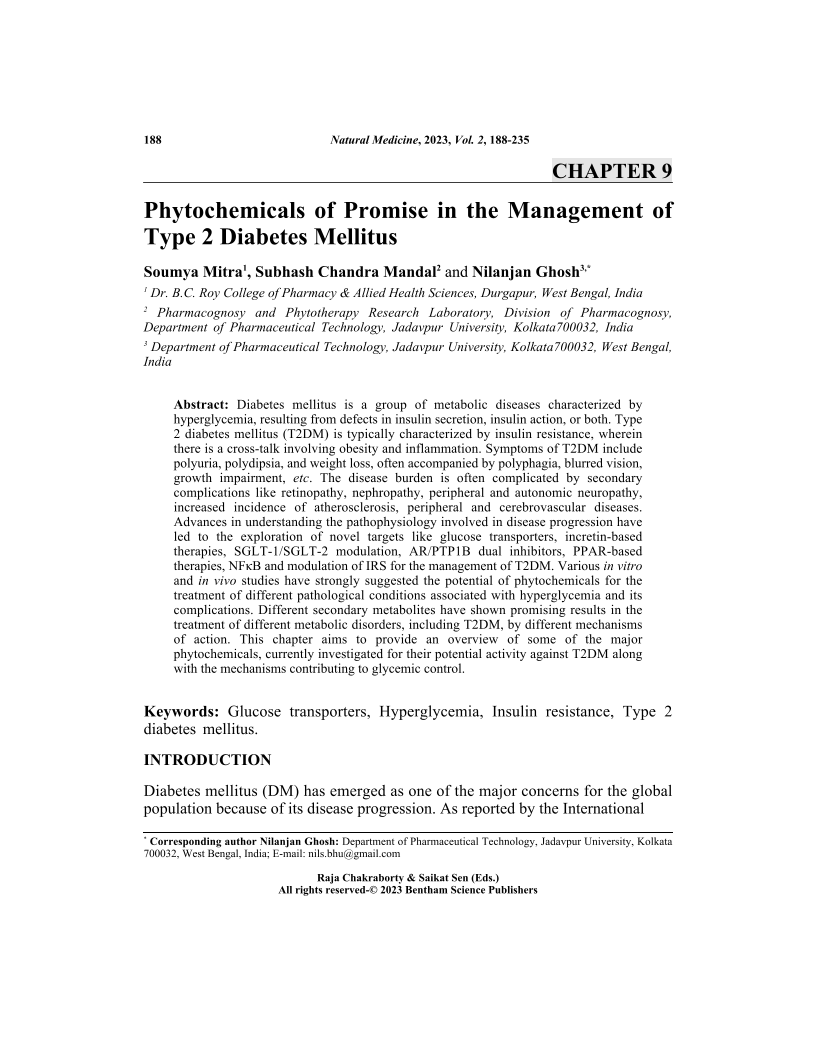Phytochemicals of Promise in the Management of Type 2 Diabetes Mellitus

- Authors: Soumya Mitra1, Subhash Chandra Mandal2, Nilanjan Ghosh3
-
View Affiliations Hide Affiliations1 Dr. B.C. Roy College of Pharmacy & Allied Health Sciences, Durgapur, West Bengal, India 2 Pharmacognosy and Phytotherapy Research Laboratory, Division of Pharmacognosy, Department of Pharmaceutical Technology, Jadavpur University, Kolkata700032, India 3 Department of Pharmaceutical Technology, Jadavpur University, Kolkata700032, West Bengal, India
- Source: New Avenues in Drug Discovery and Bioactive Natural Products , pp 188-235
- Publication Date: August 2023
- Language: English
Phytochemicals of Promise in the Management of Type 2 Diabetes Mellitus, Page 1 of 1
< Previous page | Next page > /docserver/preview/fulltext/9789815136326/chap9-1.gif
Diabetes mellitus is a group of metabolic diseases characterized by hyperglycemia, resulting from defects in insulin secretion, insulin action, or both. Type 2 diabetes mellitus (T2DM) is typically characterized by insulin resistance, wherein there is a cross-talk involving obesity and inflammation. Symptoms of T2DM include polyuria, polydipsia, and weight loss, often accompanied by polyphagia, blurred vision, growth impairment, etc. The disease burden is often complicated by secondary complications like retinopathy, nephropathy, peripheral and autonomic neuropathy, increased incidence of atherosclerosis, peripheral and cerebrovascular diseases. Advances in understanding the pathophysiology involved in disease progression have led to the exploration of novel targets like glucose transporters, incretin-based therapies, SGLT-1/SGLT-2 modulation, AR/PTP1B dual inhibitors, PPAR-based therapies, NFκB and modulation of IRS for the management of T2DM. Various in vitro and in vivo studies have strongly suggested the potential of phytochemicals for the treatment of different pathological conditions associated with hyperglycemia and its complications. Different secondary metabolites have shown promising results in the treatment of different metabolic disorders, including T2DM, by different mechanisms of action. This chapter aims to provide an overview of some of the major phytochemicals, currently investigated for their potential activity against T2DM along with the mechanisms contributing to glycemic control. nbsp;
-
From This Site
/content/books/9789815136326.chap9dcterms_subject,pub_keyword-contentType:Journal -contentType:Figure -contentType:Table -contentType:SupplementaryData105

